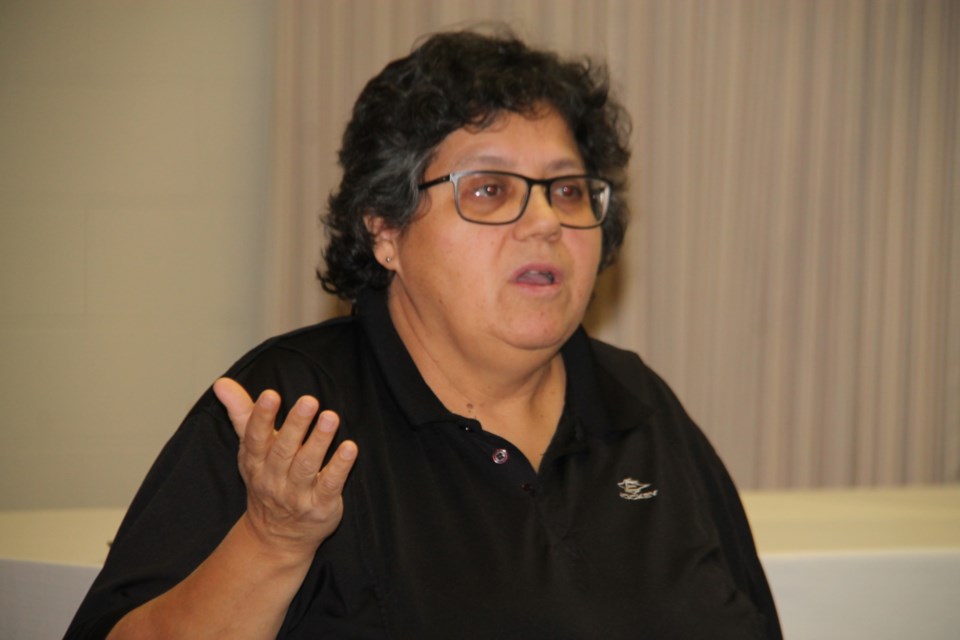Mona Jones, Huron-Superior Catholic District School Board (H-SCDSB) Indigenous Education Lead, is encouraged with the role Indigenous elders have been playing in many of the board’s schools.
Jones, of Garden River First Nation, presented Huron-Superior administrators and trustees with a review of an in-school program involving Indigenous elders, with a preview of what’s ahead, at Wednesday’s regular board meeting.
Eight elders from Garden River and Batchewana First Nation Territories began with the elders in the school program in 2018, at Holy Cross School for four sessions a week, and two sessions weekly at St. Mary’s French Immersion and St. Mary’s College.
“We are making history with our program,” Jones said.
“They were very prepared. The results were awesome. They had kids saying phrases in Ojibway, native and non-native kids. It was really neat to see the benefits. The teachers were also getting the knowledge they needed. With the Ministry pushing Indigenous perspectives in all parts of the curriculum, the elders were bringing the curriculum into the classroom.”
The presentation by Jones was accompanied by a set of photographs of elders interacting with students, including one depicting elders preparing Indigenous rabbit soup and scones for students at a H-SCDSB school.
“In a society point of view, it was true reconciliation happening because this wasn’t just for the native kids, it was for all kids, and teachers. So not only were the students learning, the teachers were also learning alongside, and that whole way of learning is really reflective of us as Indigenous people,” Jones said.
“Historically, before settlers arrived, that’s how we learned. Our classroom was out in the bush, our classroom was on the rivers learning how to catch fish, learning from the elders, whether they were Mom and Dad, an aunt or uncle, grandmother or grandfather.”
“They carry history, they carry stories, they carry wisdom and lived experiences and we want to tap into that knowledge in classroom programs,” Jones said.
“They came in with different backgrounds. Some had knowledge of history, some had knowledge of crafts, some had knowledge of language, they came in with their own little sets of information,” Jones said, adding the elders were nervous to visit the schools at first, but were supported and encouraged by Indigenous educators, who sometimes led the elders into the classrooms by literally holding their hands.
At least one elder was a residential school survivor, Jones said.
Jones said the elders presence in the schools was in keeping with the Truth and Reconciliation Commission of Canada’s calls to action, which includes a call for all students to learn of Indigenous history, the Residential School experience, culture, traditions and some language lessons.
Jones said “the elders were nervous but they stuck it out...they got a lot of hugs and smiles from the students. It was very healing for the elders because our people were not allowed to speak our language, and now our elders have been given that opportunity to share a little bit of their language with all students.”
In 2018, Jones said approximately 25 students were involved in each elder session, amounting to approximately 600 students and 24 teachers taking part each week.
In 2019, the elders program partnered with the Algoma District School Board (ADSB) and included 14 elders, running for 20 weeks in five H-SCDSB elementary schools as well as St. Mary’s College.
In the current 2019-2020 school year, beginning in October and continuing to May, elders are visiting seven H-SCDSB elementary schools and St. Mary’s College, with two Metis Senators joining the group, the program expanding into the greater H-SCDSB district, including schools in communities such as Massey and Chapleau, Jones said.
This spring and summer will include more land based learning, with H-SCDSB students visiting elders in Garden River and Batchewana First Nation Territories.
Elders are individuals who are considered to have exceptional knowledge and a number of life experiences to share, some as young as 55, Jones explained.
Jones said she has been encouraged by educators to repeat the program next school year.
“It’s great relationship building.” Jones said.
